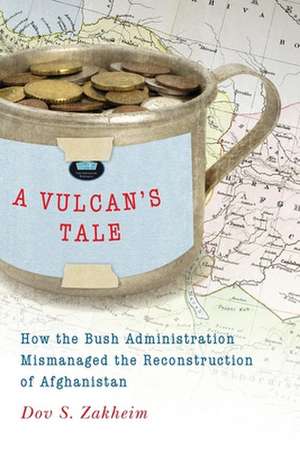A Vulcan's Tale: How the Bush Administration Mismanaged the Reconstruction of Afghanistan
Autor Dov S. Zakheimen Limba Engleză Paperback – 10 iul 2013
A firsthand account of how the Bush administration mismanaged its Afghan campaign, A Vulcan's Tale shines new and important light on the events and people behind the headlines in the immediate years following the September 11 attacks.
The "Vulcans," so named by Condoleezza Rice, were eight foreign policy experts who advised George W. Bush during his 2000 presidential campaign. After Bush assumed the presidency, the Vulcans helped shape the administration's foreign policy following 9/11, including the military operations in Afghanistan and Iraq. All were veterans of past administrations, having served under either Ronald Reagan or George H. W. Bush, and they included among their ranks Dov Zakheim. Made comptroller and chief financial officer for the Department of Defense in 2001, Zakheim was also named the DoD's coordinator for Afghan civilian reconstruction in 2002.
In A Vulcan's Tale, Zakheim draws on his own participation and intimate knowledge to analyze how the United States missed critical opportunities while it struggled to manage two wars, particularly the seemingly endless endeavor in Afghanistan. In his view, the Bush administration's disappointing results in Afghanistan were partly attributable to the enormity of the challenges, certainly. But flawed leadership and deficiencies of management, understanding, and forethought all played their parts as well.
The power of the purse proved to be especially damaging. The Office of Management and Budget was slow to fund Defense's efforts at the outset of the Afghan conflict and then inadequately funded the State Department and the U.S. Agency for International Development, casting the die for several additional years of conflict. The invasion of Iraq siphoned off critical resources for Afghanistan, thereby further complicating that country's reconstruction.
Even with public policy of the highest order, the devil still lurked in the details, as the DoD's "money man" was soon to discover while he struggled to fund and manage the reconstruction of civilian Afghanistan. A Vulcan's Tale is an authoritative, candid but fair account of how a wise and admirable goal can be waylaid by insufficient funding and ineffective coordination, with the result of faulty—or, at best, incomplete—implementation.
The "Vulcans," so named by Condoleezza Rice, were eight foreign policy experts who advised George W. Bush during his 2000 presidential campaign. After Bush assumed the presidency, the Vulcans helped shape the administration's foreign policy following 9/11, including the military operations in Afghanistan and Iraq. All were veterans of past administrations, having served under either Ronald Reagan or George H. W. Bush, and they included among their ranks Dov Zakheim. Made comptroller and chief financial officer for the Department of Defense in 2001, Zakheim was also named the DoD's coordinator for Afghan civilian reconstruction in 2002.
In A Vulcan's Tale, Zakheim draws on his own participation and intimate knowledge to analyze how the United States missed critical opportunities while it struggled to manage two wars, particularly the seemingly endless endeavor in Afghanistan. In his view, the Bush administration's disappointing results in Afghanistan were partly attributable to the enormity of the challenges, certainly. But flawed leadership and deficiencies of management, understanding, and forethought all played their parts as well.
The power of the purse proved to be especially damaging. The Office of Management and Budget was slow to fund Defense's efforts at the outset of the Afghan conflict and then inadequately funded the State Department and the U.S. Agency for International Development, casting the die for several additional years of conflict. The invasion of Iraq siphoned off critical resources for Afghanistan, thereby further complicating that country's reconstruction.
Even with public policy of the highest order, the devil still lurked in the details, as the DoD's "money man" was soon to discover while he struggled to fund and manage the reconstruction of civilian Afghanistan. A Vulcan's Tale is an authoritative, candid but fair account of how a wise and admirable goal can be waylaid by insufficient funding and ineffective coordination, with the result of faulty—or, at best, incomplete—implementation.
Preț: 235.92 lei
Nou
Puncte Express: 354
Preț estimativ în valută:
45.15€ • 46.87$ • 37.65£
45.15€ • 46.87$ • 37.65£
Carte tipărită la comandă
Livrare economică 22 martie-05 aprilie
Preluare comenzi: 021 569.72.76
Specificații
ISBN-13: 9780815725466
ISBN-10: 0815725469
Pagini: 335
Ilustrații: black & white illustrations
Dimensiuni: 152 x 229 x 20 mm
Greutate: 0.52 kg
Editura: Brookings Institution Press
Colecția Brookings Institution Press
ISBN-10: 0815725469
Pagini: 335
Ilustrații: black & white illustrations
Dimensiuni: 152 x 229 x 20 mm
Greutate: 0.52 kg
Editura: Brookings Institution Press
Colecția Brookings Institution Press
Notă biografică
Dov S. Zakheim served as the under secretary of defense (comptroller) and chief financial officer for the U.S. Department of Defense from May 2001 to April 2004. He also served in various Defense Department positions during the Reagan administration, including deputy undersecretary for planning and resources. Zakheim is the author of Flight of the Lavi: Inside a U.S.-Israeli Crisis (Brassey's).
Descriere
A firsthand account of how the Bush administration mismanaged its Afghan campaign, A Vulcan's Tale shines new and important light on the events and people behind the headlines in the immediate years following the September 11 attacks.
The "Vulcans," so named by Condoleezza Rice, were eight foreign policy experts who advised George W. Bush during his 2000 presidential campaign. After Bush assumed the presidency, the Vulcans helped shape the administration's foreign policy following 9/11, including the military operations in Afghanistan and Iraq. All were veterans of past administrations, having served under either Ronald Reagan or George H. W. Bush, and they included among their ranks Dov Zakheim. Made comptroller and chief financial officer for the Department of Defense in 2001, Zakheim was also named the DoD's coordinator for Afghan civilian reconstruction in 2002.
In A Vulcan's Tale, Zakheim draws on his own participation and intimate knowledge to analyze how the United States missed critical opportunities while it struggled to manage two wars, particularly the seemingly endless endeavor in Afghanistan. In his view, the Bush administration's disappointing results in Afghanistan were partly attributable to the enormity of the challenges, certainly. But flawed leadership and deficiencies of management, understanding, and forethought all played their parts as well.
The power of the purse proved to be especially damaging. The Office of Management and Budget was slow to fund Defense's efforts at the outset of the Afghan conflict and then inadequately funded the State Department and the U.S. Agency for International Development, casting the die for several additional years of conflict. The invasion of Iraq siphoned off critical resources for Afghanistan, thereby further complicating that country's reconstruction.
Even with public policy of the highest order, the devil still lurked in the details, as the DoD's "money man"
The "Vulcans," so named by Condoleezza Rice, were eight foreign policy experts who advised George W. Bush during his 2000 presidential campaign. After Bush assumed the presidency, the Vulcans helped shape the administration's foreign policy following 9/11, including the military operations in Afghanistan and Iraq. All were veterans of past administrations, having served under either Ronald Reagan or George H. W. Bush, and they included among their ranks Dov Zakheim. Made comptroller and chief financial officer for the Department of Defense in 2001, Zakheim was also named the DoD's coordinator for Afghan civilian reconstruction in 2002.
In A Vulcan's Tale, Zakheim draws on his own participation and intimate knowledge to analyze how the United States missed critical opportunities while it struggled to manage two wars, particularly the seemingly endless endeavor in Afghanistan. In his view, the Bush administration's disappointing results in Afghanistan were partly attributable to the enormity of the challenges, certainly. But flawed leadership and deficiencies of management, understanding, and forethought all played their parts as well.
The power of the purse proved to be especially damaging. The Office of Management and Budget was slow to fund Defense's efforts at the outset of the Afghan conflict and then inadequately funded the State Department and the U.S. Agency for International Development, casting the die for several additional years of conflict. The invasion of Iraq siphoned off critical resources for Afghanistan, thereby further complicating that country's reconstruction.
Even with public policy of the highest order, the devil still lurked in the details, as the DoD's "money man"


















